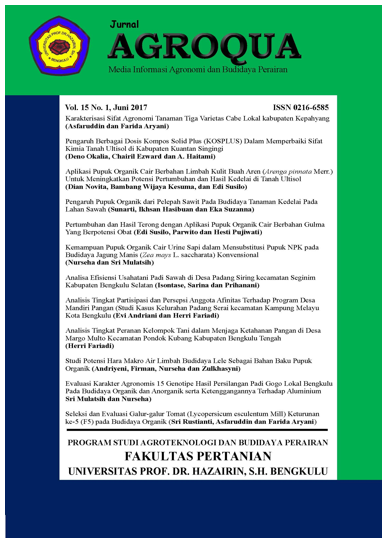RESPON PEMBERIAN PUPUK HAYATI TERHADAP SIFAT BIOLOGI TANAH PADA TANAMAN KEDELAI DI ULTISOLS
Keywords:
soybean, biofertilizer, technology, ultisolsAbstract
The purposes of this research are (1) to know the influence of genotype and biological fertilizer to the soil biological properties, and (2) to know the influence of genotype and biological fertilizer to the soybean plants productivity at its ultisols. This experiment was conducted at experimental garden of Bengkulu University. It was arranged in factorial split plot design and consisted of two factor. The first factor was soybean cultivars i.e. Pangrango, Ceneng, and DS1 (Malabar and Kipas Putih variety breeding). The second factor was double inoculation of Rhizobium and VAM i.e. Glomus manihotis + Rhizobium of KLR 5.3 strain, Glomus manihotis + Rhizobium of TER 2.2 strain, Gigaspora margarita + Rhizobium of KLR 5.3 strain, Gigaspora margarita + Rhizobium of TER 2.2 strain, fertilizer NPK at recommended dosage without inoculants respectively. The collected data was analyzed statistically and tested by F test at level of 5% and continued with Duncan Multiple Range test for differences among the treatments. The result of the research showed that (1) the soil that had been planted genotype DS1 soybean has the highest level of C-Organic (2,69%) compare with pangrango or ceneng and biological fertilizer produces higher level of respiration than its control. (2) ceneng’s genotype produce the effective amount of nodules, plant dry weight (3,90 g), and seed weight (5,66 g) is higher than if we compare with pangrango and DSI.
Keywords : soybean, biofertilizer technology , Ultisols
References
Downloads
Published
Issue
Section
License
Authors who publish with this journal agree to the following terms:
- Authors grant the journal right of first publication with the work simultaneously licensed under a Creative Commons Attribution 4.0 Internasional (CC BY 4.0) Licence that allows others to use and share the work with an acknowledgment of the work's authorship and initial publication in this journal.
- The author(s) still hold the copyright of his/her/their work and retain publishing rights without restrictions such as (but not limited to) patent right, lecture, book and reproduce the article for own purposes.
















